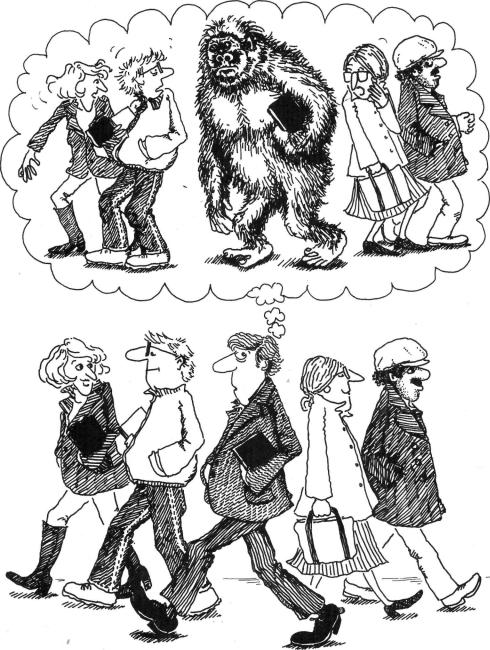
contactusa
.pdf
familiarity |
(9) |
disorientated |
(12) |
|
successful |
(10) |
|
homesick |
(13) |
impression |
(11) |
|
illness |
(14) |
(15)international, intercultural: inter means Another example:
(16)self-conscious, self-image: self means
Another example:
E. Skimming
Look quickly at the next page. Answer these questions.
1.What is this page?
2.How is it organized?
F. Scanning
Answer these questions as quickly as possible.
1.How many different kinds of restaurants are listed here?
2.What is the name of an Indonesian restaurant?
3.Which restaurants recommend reservations?
4.Where is Zola located?
5.How many Japanese restaurants are there?
6.Which restaurants are open after midnight?
7.Which restaurant serves Kirin beer?
8.How many health food restaurants are listed?
9.Is Assad's an Indian restaurant?
10.Where would you like to eat tonight?
Look Back |
69 |

R RESTAURANTS |
1314 |
•

chapter 5
Culture Shock
section 1
A First Look
A. Background Building
DIRECTIONS: Answer these questions about yourself. The ones on this page are about your first days in the U.S. The ones on the next page are about how you feel now.
My first days in the U.S. |
|
|
|
|
|
|
|
|
|
||||||
I_____life in America. |
|
|
|
|
|
|
|
|
|
||||||
|
|
a. loved |
b. hated |
с |
had no strong feelings about |
||||||||||
I______being with Americans. |
|
|
|
||||||||||||
|
|
a. loved |
b. hated |
с |
had no strong feelings about |
||||||||||
I |
English. |
|
|
|
|
|
|
|
|
|
|||||
|
|
|
|
|
|
|
|
|
|
|
|
|
|
|
|
|
|
a. loved |
b. hated |
с |
had no strong feelings about |
||||||||||
I____homesick most of the time. |
|
|
|
||||||||||||
|
|
a. was not |
b. was |
|
|
|
|||||||||
I wanted to spend my time with __ |
|
|
|
|
|
||||||||||
|
|
a. Americans |
b. people from my culture |
||||||||||||
I wanted to speak |
|
|
|
|
|
|
|
|
|
||||||
|
|
a. English |
|
|
b. my language |
|
|
|
|||||||
I thought life in America was |
|
|
|
|
|
||||||||||
|
|
a. wonderful |
b. terrible |
|
|
|
|||||||||
I thought Americans were |
|
|
|
|
|
|
|
|
|
||||||
|
|
|
|
|
|
|
|
|
|||||||
|
|
a. wonderful |
|
b. terrible |
|
|
|
||||||||
I______to go home after one week. |
|
|
|
||||||||||||
|
|
a. didn't want |
b. wanted |
|
|
|
|||||||||
Count your "a" answers and your " b " answers, a. |
|
b. __________ |
|||||||||||||
|
|
|
|
|
|
|
|
|
|
|
|
|
|
|
|
73

NOW
I |
life in America. |
|
|
|
|
|
|
|
|
|
||||||||
|
|
|
|
|
|
|
|
|
|
|
|
|
|
|
|
|
|
|
|
|
a. love |
b. hate |
с |
have no strong |
|||||||||||||
|
|
|
|
|
|
|
|
|
|
|
|
|
|
|
feelings |
about |
||
I |
being with Americans. |
|
|
|
|
|
|
|
|
|
||||||||
|
|
|
|
|
|
|
|
|
|
|
|
|
|
|
|
|
|
|
|
|
a. love |
b. hate |
с |
have no strong |
|||||||||||||
|
|
|
|
|
|
|
|
|
|
|
|
|
|
|
feelings |
about |
||
I |
|
English. |
|
|
|
|
|
|
|
|
|
|||||||
|
|
|
|
|
|
|
|
|
|
|
|
|
|
|
|
|
|
|
|
|
a. love |
b. hate |
с |
have no strong |
|||||||||||||
|
|
|
|
|
|
|
|
|
|
|
|
|
|
|
feelings |
about |
||
I |
|
homesick most of the time. |
|
|
|
|
|
|
||||||||||
|
|
|
|
|
|
|
|
|
|
|
|
|
|
|
|
|
|
|
|
|
a. am not |
b. am |
|
|
|
|
|
|
|||||||||
I want to spend my time with |
|
|
|
|
|
|
|
|
|
|
||||||||
|
|
a. Americans |
b. people from my culture |
|
|
|
|
|
|
|||||||||
I want to speak |
|
|
|
|
|
|
|
|
|
|||||||||
|
|
a. English |
|
|
b. my language |
|
|
|
|
|
|
|||||||
I think life in America is |
|
|
|
|
|
|
|
|
|
|||||||||
|
|
a. wonderful |
|
|
b. terrible |
|
|
|
|
|
|
|||||||
I think Americans are |
|
|
|
|
|
|
|
|
|
|||||||||
|
|
a. wonderful |
|
|
b. terrible |
|
|
|
|
|
|
|||||||
I |
|
to go home in one week. |
|
|
|
|
|
|
|
|
|
|||||||
|
|
|
|
|
|
|
|
|
|
|
|
|||||||
|
|
a. don't want |
b. want |
|
|
|
|
|
|
|||||||||
Count your "a" answers and your "b " answers, a. |
|
|
b. |
|
|
|||||||||||||
|
|
|
|
|
|
|
|
|
|
|
|
|
|
|
|
|
|
|
The title of this chapter is "Culture Shock." What do you think that means?
B. Topic '
DIRECTIONS: Before you begin to read, look at these topics. There is one topic for each paragraph. Look quickly at the reading to find these topics. Do not read every word at this point. Write the number of the paragraph next to the topic of that paragraph.
1.the people who experience culture shock
2.the things people say when you leave home
74 Culture Shock

3.three stages of culture shock
4.the feelings of culture shock
5.problems in a new culture
6.definition of culture shock
C. Reading
DIRECTIONS: Now read.
1 |
"You're going to the United States to live? How wonderful! |
1 |
|
You're really lucky!" |
2 |
|
Does this sound familiar? Perhaps your family and friends said |
3 |
|
similar things to you when you left home. But does it seem true all |
4 |
|
the time? Is your life in this new country always wonderful and |
5 |
2 |
exciting? Specialists in counseling and intercultural studies say that |
6 |
|
it is not easy to adjust to life in a new culture. They call the feelings |
7 |
|
which people experience when they come to a new environment cul- |
8 |
|
ture shock. |
9 |
|
According to these specialists, there are three stages of culture |
10 |
|
shock. In the first stage, the newcomers like their environment. |
11 |
3 |
Then, when the newness wears off, they begin to hate the city, the |
12 |
|
country, the people, the apartment, and everything else in the new |
13 |
|
culture. In the final stage of culture shock, the newcomers begin to |
14 |
|
adjust to their surroundings and, as a result, enjoy their life more. |
15 |
|
Some of the factors in culture shock are obvious. Maybe the |
16 |
|
weather is unpleasant. Perhaps the customs are different. Perhaps |
17 |
|
the public service systems such as the telephone, post office, or |
18 |
|
transportation are difficult to figure out and you make mistakes. |
19 |
|
The simplest things seem difficult. The language may be difficult. |
20 |
|
How many times have you just repeated the same thing again and |
21 |
|
again and hoped to understand the answer eventually? The food |
22 |
|
may seem strange to you and you may miss the familiar smells of |
23 |
|
the food you are accustomed to in your own country. If you don't |
24 |
4 |
look similar to the natives, you may feel strange. You may feel like |
25 |
|
everyone is watching you. In fact, you are always watching your- |
26 |
|
self. You are self-conscious. |
27 |
|
Who experiences culture shock? Everyone does in some form |
28 |
|
or another. But culture shock comes as a surprise to most people. |
29 |
|
A lot of the time, the people with the worst culture shock are the |
30 |
|
people who never had any difficulties in their own countries. They |
31 |
5 |
were active and successful in their community. They had hobbies |
32 |
|
or pastimesrwhich they enjoyed. When they come to a new country, |
33 |
|
they do not have the same established positions or hobbies. They |
34 |
A First Look |
75 |
find themselves without a role, almost without an identity. They |
35 |
have to build a new self-image. |
36 |
Culture shock produces a feeling of disorientation. This dis- | |
37 |
orientation may be homesickness, imagined illness, or even para- |
38 |
noia (unreasonable fear). When people feel the disorientation of cul- |
39 |
ture shock, they sometimes feel like staying inside all the time. They |
40 |
want to protect themselves from the unfamiliar environment. They |
41 |
want to create an escape within their room or apartment to give |
42 |
themselves a sense of security. This escape does solve the problem |
43 |
of culture shock for the short term, but it does nothing to familiar- |
44 |
ize the person more with the culture. Familiarity and experience are |
45 |
the long-term solutions to the problem of culture shock. |
46 |
React
1.Look at the reading. Underline a sentence you agree with.
2.Underline a sentence you don't understand.
3.Discuss these sentences with your classmates and teacher.
D.Scanning/Vocabulary
PART 1
DIRECTIONS: Write the line number where you find the word(s). Then choose the best meaning for the word as it is used in that sentence.
1. |
specialists |
line number |
|
|
|||
|
a. authorities |
b. important people |
с |
doctors |
|||
2. |
environment |
line number |
|
|
|
|
|
|
a. place around |
b. time you live in |
с |
country |
|||
|
you |
|
|
|
|
|
|
3. stages |
Hne number |
|
|
|
|
||
|
a. part of a theater |
b. progressive parts |
с |
transportation |
|||
4. |
final |
hne number |
|
|
|
|
|
|
a. most important |
b. most difficult |
с |
last |
|||
76 |
Culture Shock |
|
|
|
|
|
|

5.obvious
a.easy to see
6.figure out
a.see
7.self-conscious
a.aware of yourself
8.role
a.part in a play
9.paranoia
a.good feeling
10. term
,a. condition
Part 2
line number |
|
|
||||
|
|
|
|
|
с |
factors |
b. difficult |
||||||
line number |
|
|
||||
|
|
|
|
с |
understand |
|
b. design |
||||||
line number |
|
|
|
|
||
b. embarrassed |
с |
homesick |
||||
line number |
|
|
||||
b. friend |
с |
position |
||||
line number |
|
|
||||
b. imagined illness |
с |
unreasonable fear |
||||
line number |
|
|
|
|
||
b. word or expression |
с |
length of time |
||||
DIRECTIONS: Find a word that is the opposite of the one given. The line where you will find the word is,given.
1.line 2 unlucky
2.line 11 native
3. line 20 most difficult
4.line 23 forget
5.line 30 best
6.line 32 lazy
7.line 38 real
8.line 42 destroy
E. Reading Comprehension
DIRECTIONS: Circle the letter of the choice that best completes each sentence.
1. |
There are apparently |
stages of culture shock. |
|
||
|
a. two |
|
b. three |
с |
four |
2. |
People who come to a new environment |
feel lucky and happy. |
|||
|
a. do not always |
|
b. always |
с |
never |
|
|
|
|
||
A First Look 77
3. |
According to the author, it |
|
|
easy to adjust to a new culture. |
||||||||||||||
|
a. is always |
|
|
|
|
b. is usually |
|
|
с is not |
|||||||||
4. |
The author gives |
|
examples of public service systems. |
|
|
|||||||||||||
|
a. two |
|
|
|
|
|
b. three |
|
|
с |
four |
|||||||
5. |
Someone who looks |
|
the natives of a country may feel strange. |
|||||||||||||||
|
a. similar to |
|
|
|
|
b. |
at |
|
|
с |
different from |
|||||||
6. |
People in a foreign culture feel |
|
|
|
|
about themselves and their positions. |
||||||||||||
|
a. differently |
|
|
|
|
b. the same |
|
|
с |
happy |
||||||||
7. |
The author gives |
|
|
examples of the disorientation of culture shock. |
||||||||||||||
|
a. two |
|
|
|
|
b. three |
|
|
с |
four |
||||||||
8. |
The author thinks that it is |
|
|
|
idea for people feeling culture shock to stay in |
|||||||||||||
|
their homes as a long-term solution to culture shock. |
|
|
|||||||||||||||
|
a. not a good |
|
|
|
|
b. a great |
|
|
с |
not a bad |
||||||||
9. |
In the final stage of culture shock, people |
|
the new environment. |
|||||||||||||||
|
||||||||||||||||||
|
a. love |
|
|
|
|
b. |
adjust to |
|
|
с |
hate |
|||||||
10. People who feel culture shock stay at home because of |
|
|
|
|||||||||||||||
|
a. insecurity |
|
|
|
|
b. solutions |
|
|
с |
the weather |
||||||||
78 Culture Shock
section 2
Look Again
A. Vocabulary
DIRECTIONS: Circle the letter of the choice that best completes each sentence.
1. In this reading, a specialist is probably |
|
|
|
|
|
|
||||||||||||||||
a. a doctor |
|
|
|
b. an authority |
|
|
С |
a newcomer |
||||||||||||||
2. Your |
|
is the area around you. |
|
|
|
|
|
|||||||||||||||
a. environment |
|
|
|
b. culture |
|
|
с |
self-image |
||||||||||||||
3. Disorientation is a feeling of |
|
|
|
|
|
|
|
|||||||||||||||
a. security |
|
|
|
|
|
b. knowledge |
|
|
с |
unreality |
||||||||||||
4. I can't figure out my homework. I can't |
|
it. |
|
|
||||||||||||||||||
|
|
|
|
|
|
|
|
|
|
|
|
|
|
|
|
|
|
|||||
a. remember |
|
|
|
b. escape from |
|
|
с |
understand |
||||||||||||||
5. I am bored. My life is not |
|
|
|
enough. |
|
|
|
|
|
|||||||||||||
|
|
|
|
|
|
|
|
|
|
|
|
|
|
|
|
|
||||||
a. experienced |
|
|
|
b. active |
|
|
с |
essential |
||||||||||||||
6. People usually have hobbies for |
|
|
|
|
|
|
|
|||||||||||||||
a. money |
|
|
|
|
|
b. enjoyment |
|
|
с |
a job |
||||||||||||
7. A newcomer is |
|
with the area around him or her. |
|
|
||||||||||||||||||
a. unfamiliar |
|
|
|
|
b. unhappy |
|
|
с |
accustomed to |
|||||||||||||
8. When you feel that everyone is watching you, you are |
|
|
|
|||||||||||||||||||
a. secure |
|
|
|
|
|
b. self-conscious |
|
|
с |
unfamiliar |
||||||||||||
9. Paranoia is a feeling of |
|
|
|
|
|
|
|
|
|
|
|
|
|
|
|
|
|
|||||
a. fear |
|
|
|
|
|
b. happiness |
|
|
с |
experience |
||||||||||||
10. I don't know him. I don't know his |
|
|
|
|
|
|
|
|||||||||||||||
a. system |
|
|
|
|
|
b. identity |
|
|
с |
term |
||||||||||||
79
